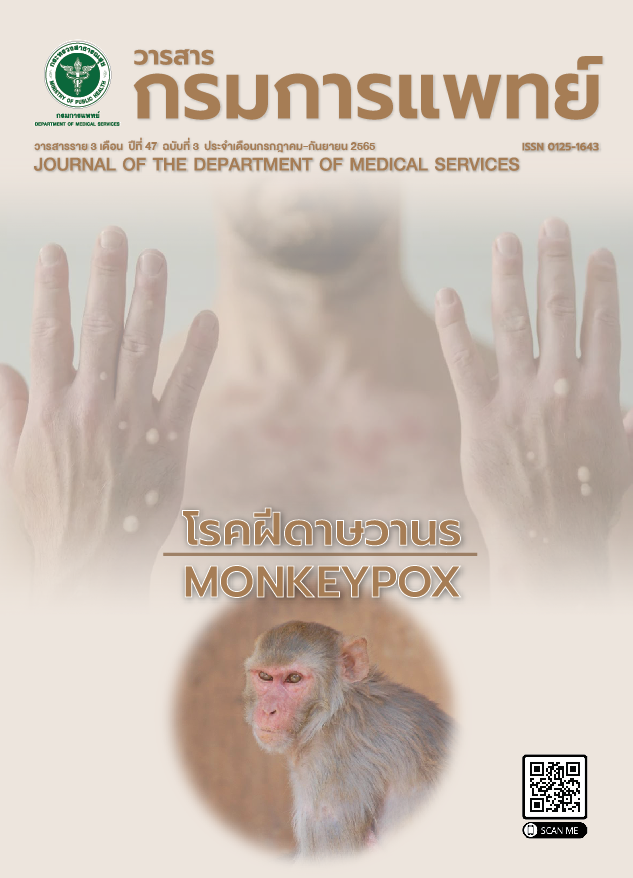Development of Self-management Support for Self-management Behaviors in the Post- COVID -19 Patients on Residual Symptoms in Covid 19 Patients Healed
Keywords:
Self-management support, Self-management residual symptoms, Post-COVID-19 symptomsAbstract
Background: Post COVID-19 infection has long-term health impacts on patients’ mental health and lifestyle, and self-management support can help patients better manage their residual COVID symptoms. Objectives: To develop and evaluate a model of self-management support for residual symptoms among COVID-19 patients. Methods: Data were analyzed for descriptive statistics and repeated measure MANOVA. 62 COVID-19 patients who met the criteria were recruited from Chonburi Hospital and they completed the measures of self-management behaviors and clinical outcomes at baseline (one-week after discharge), 4 weeks and 8 weeks after discharge with Cronbach's alpha coefficients of 0.88 and 0.82, respectively. Results: Self-management model including 1. Identifying the problem and evaluate residual symptoms 2. Problem solving and self-management support 3. Self-management assessment 4. Follow up. Behavior outcome showed more self-management support and better quality of life. Clinical outcomes showed lower mean scores on dyspnea, fatigue depression, and insomnia with greater SpO2 and lung efficiency. Conclusion: Self-management model support facilitates patients with post-COVID-19 symptoms to perform self-management behaviors and mitigate symptoms of post COVID-19 symptoms. Therefore, patients with post COVID-19 should receive a great deal of self-management support for better self-care after discharge from the hospital.
References
Cuapio A, Villapol S. More than 50 long-term effects of COVID-19: A systematic review and meta-analysis. [Intrenet] 2021. [cited 2021 Apr 28]. Available from: https://pubmed.ncbi.nlm.nih.gov/33532785/
COVID-19 Treatment Commission. Revised edition on 2 November 2021 for Physicians and public health personnel Guidelines for medical practice, diagnosis, care and prevention of infection in hospitals.In the case of coronavirus disease 2019 (COVID-19). [Internet] 2021. [cited 2021 Dec 16]. Available from: https://www.covid19.dms.go.th/Content/Select_Landding page?contentId=155.
Thongchai C. Long COVID hurt but not.[Internet]2021. [cited 2021 Dec 16]. Available form:https://www.sikarin.com/health/covid19/long-covidurts.
Kathy O. Primary care nursing’s ‘huge role’ in long Covid. [Internet] 2021. [cited 2021 Apr 22]. Available from: https://www.nursinginpractice.com/community-nursing/primary-care-nursings-huge-role-in-long-covid/.
Creer TL, Holroyd KA. Self-management. In: Baum A, McManus C, Newman S, Weinman J, West R, editors, Cambridge handbook of psychology, health, and medicine. Cambridge University; 1997.
Karoly P. Mechanisms of Self-Regulation: A systems view. Annu Rev Psychol 1993; 44:
Glasgow RE, Funnell MM, Bonomi AE. Davis C, Beckham V, Wagner EH. Self-management aspects of the improving chronic illness care breakthrough series: implementation with diabetes and heart failure teams. Ann Behav Med 2002; 24: 80-7.
Muangsri K, Latkhommon N, Thetnon P, Prasomruk P. Self-Care Behaviors Befor-After Corona Virus Disease 2019 (COVID-19) Pandamic of Diabetic Mellitus Patients in Na Mor Ma Subdistrict, Mueang Amnat Charoen District, Amnat Charoen Province. Thai Health Science Journal and Community Public Health 2021; 4: 1-10.
Brown K, Yahyouche A, Haroon S, Camaradou J, Turner G. Long COVID and self - management. Lancet 2022; 399:355.
Creer TL, Holroyd KA. Self-management of chronic conditions: the legacy of Sir William Osler. Chronic illn 2006; 2: 7-14.
Shadish WR, Cook TD, Campbell DT. Experimental and quasi-experimental designs for generalized causal inference: Houghton Mifflin Boston; 2002.
Nursing Division, Ministry of Public Health. Guidelines for collecting indicators for improving the quality of nursing services fiscal year. [Internet] 2021. [cited 2021 Dec 25]. Available form: https://www.don.go.th/?page_id=917.
Duangsai S, Chinnawong T. Effect of 5 A’s self-management support program on self – management behaviors in patients with uncontrolled hypertension. Songklanagarind Journal of Nursing 2021;41: 74-85.
Nuntawan W. Effects of self-management support program on self-anmagement behaviors among uncontrolled type II Diabetes Mellitus patients.[master’s thesis].Phitsanulok: Naresuan University; 2018.
Downloads
Published
How to Cite
Issue
Section
License
Copyright (c) 2022 Department of Medical Services, Ministry of Public Health

This work is licensed under a Creative Commons Attribution-NonCommercial-NoDerivatives 4.0 International License.
บทความที่ได้รับการตีพิมพ์เป็นลิขสิทธิ์ของกรมการแพทย์ กระทรวงสาธารณสุข
ข้อความและข้อคิดเห็นต่างๆ เป็นของผู้เขียนบทความ ไม่ใช่ความเห็นของกองบรรณาธิการหรือของวารสารกรมการแพทย์



